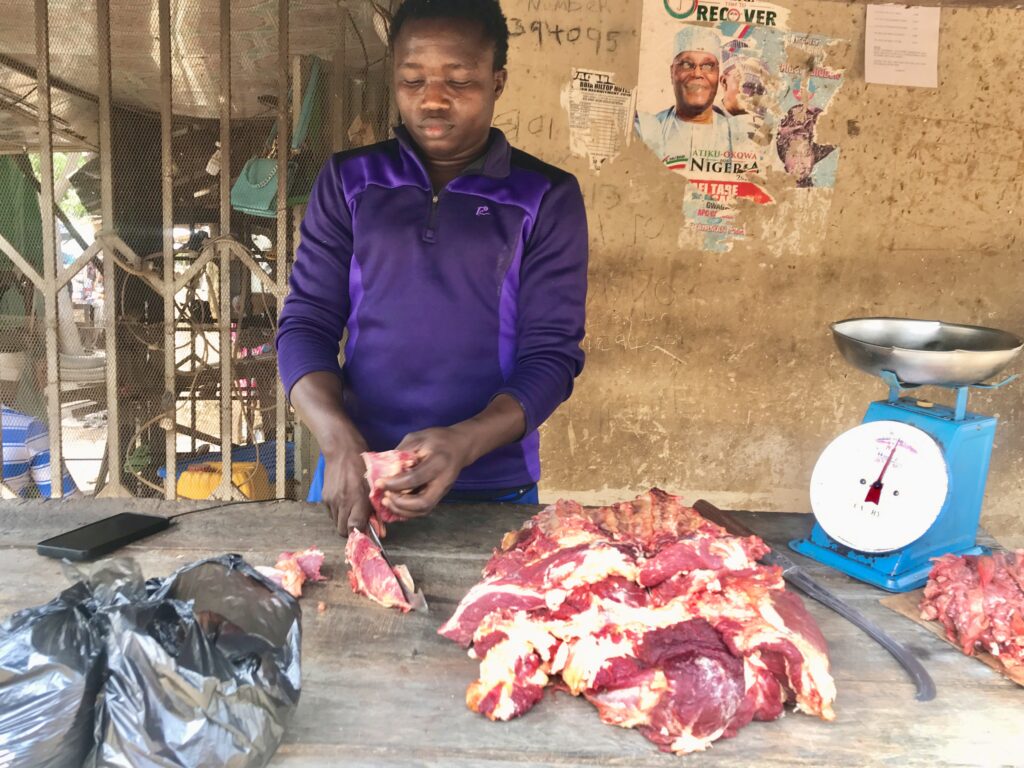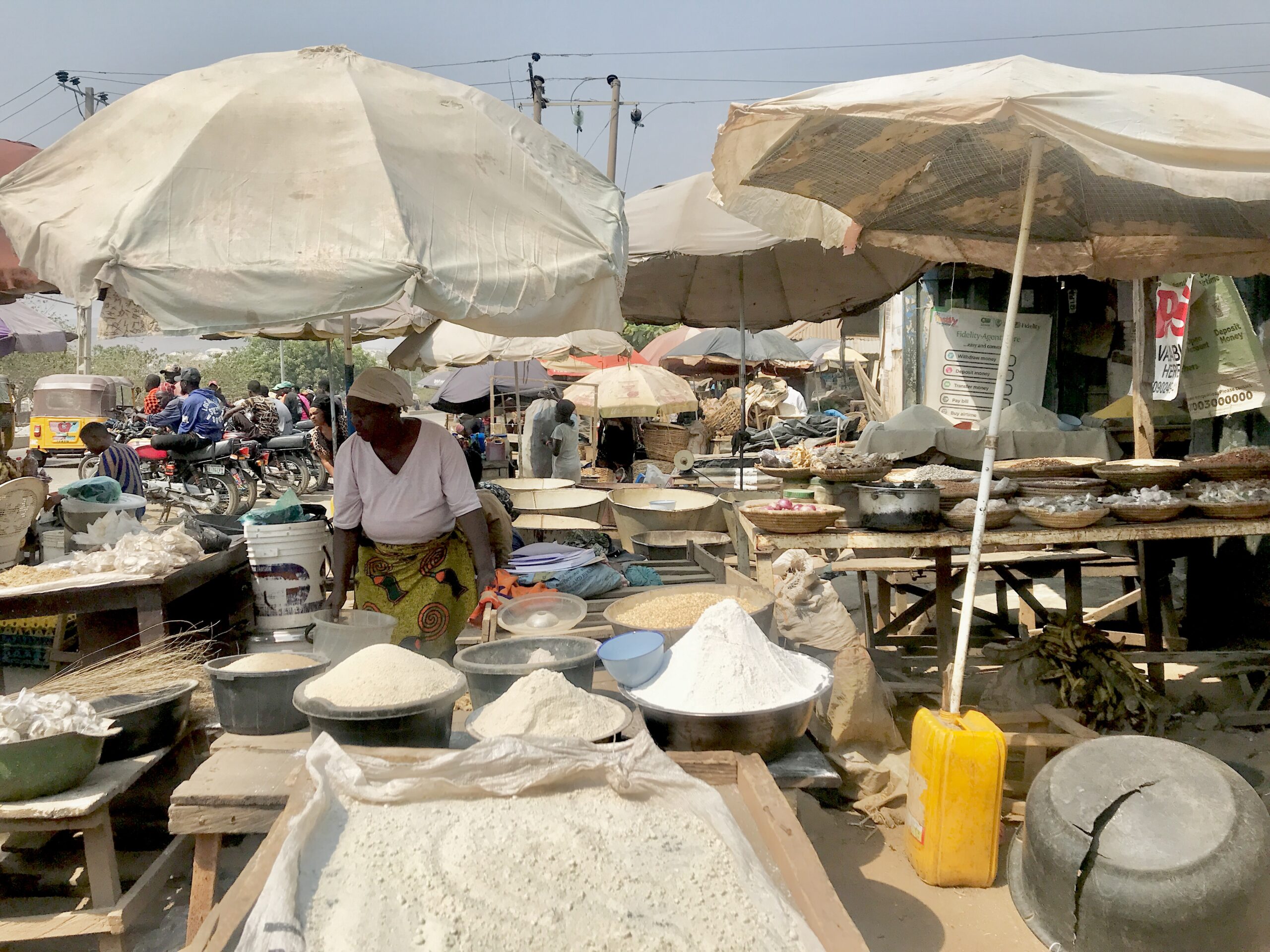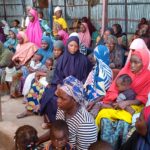In Ajata, a satellite community in Nigeria’s federal capital Abuja, Musa Jibrin can be seen in a bustling marketplace selling fresh cow meat to eager customers. Despite it being 9 am, a small crowd is already gathered, and Jibrin must quickly tend to their needs. He faces the challenge of Ramadan, fasting for 30 days while managing his business.
As he serves customers, wiping sweat from his brow and sharpening knives to keep up with demand, Jibrin carries the weight of life’s responsibilities alongside the blessings of the holy month. “This is what I do every day. It’s a business that has been passed down through three generations,” and his intention to pass down this profession is currently being threatened by the state of the economy.
“I’ve been in the meat-selling business for over 10 years now. I started by assisting my father until he passed away, and then I took over the business. There have been highs and lows, but this year has brought particularly tough experiences,” he says.
The soaring prices of goods and services in the market worry Jibrin, fearing that his business might falter, jeopardizing his plans.

Musa Jibrin attends to his customers. Photo credit: Rejoice Taddy/Prime Progress
“Things are becoming increasingly expensive, and regular customers are turning to more affordable protein sources. Last year, I sold a kilo of meat for 2500 to 3000 naira. It later rose to 3500 and 4000, and now it’s 6,500 naira, with chances of further increases in the coming months,” he explained.
Moreover, he struggles to afford the meat he sells from the abattoir. He used to assist others financially and pay friends who helped him when overwhelmed with customers, but now it’s challenging even to feed himself.
“This community has always been vibrant and happy, but it seems people are going through a lot. I’ve interacted with customers who can barely afford to eat, and that is distressing,” he noted.
Inflation bites hard
Jibrin is not alone in his struggles, the National Bureau of Statistics recently released a Consumer Price Index or CPI to explain the average change over time in the prices of goods and services consumed by people for day-to-day living.
In January 2024, the headline inflation rate rose to 29.90%, up from December 2023’s 28.92%, marking a 0.98% point increase. Compared to January 2023, the year-on-year headline inflation rate was 8.08% points higher, reaching 21.82%.
Food inflation in January 2024 stood at 35.41% year-on-year, climbing by 11.10% points from January 2023’s rate of 24.32%. This surge was attributed to the increasing prices of various food items.
The inflation hike impacts not only meat but also numerous other goods and services, as Ajata resident Martha Solomon confirmed.
“I am a mother of four and a farmer struggling to provide for my family. Even as a farmer, eating twice a day has become difficult. I sold almost everything I harvested last year because my husband was ill, and now with the increased prices of food items, I am left with the added burden of finding more ways to feed my family,” she lamented.
Solomon’s children, though young, cannot attend school due to their inability to afford fees. She had planned to enrol her two youngest children this year, but circumstances have derailed her plans.
“I may not be educated, but I understand the value, and that’s why I’ll keep striving to ensure my children are on the right path. The main issue now is feeding. A packet of indomie that used to be cheap now costs around 10,000 to 12,000 naira. A mudu of local rice is 2500. I could go on, but the fundamental truth is that we are struggling,” Solomon said.
Hope and kindness, despite all
Despite challenges, Jibrin is actively looking for ways to ease the burden for himself and his customers. “No matter the situation, I believe we shouldn’t let it bring out the worst in us. That’s why I make an effort to give my customers more meat than they pay for, even if it affects my profit,” he explained.
This generosity has earned him the loyalty of many customers, and Mrs. Sarah Adams is one of them. “Since I found Musa, I haven’t gone anywhere else. Despite price changes, he’s always been fair and compassionate.”She says.
Meanwhile, Solomon plans to use her savings to start a small restaurant and combine it with farming once the rainy season arrives. She believes this combination will make a positive difference. Despite the challenges, some individuals refuse to give up, seeking sustainable solutions and extending help to others in need.
In Ajata, a satellite community in Nigeria's capital Abuja, Musa Jibrin sells fresh cow meat at a bustling marketplace. Despite Ramadan's fasting challenges, he continues the family business passed down for three generations. However, soaring goods prices threaten the business, now selling meat at 6,500 naira per kilo, significantly up from previous years.
Jibrin faces difficulties affording meat from the abattoir and helping others financially. His customers, like mother Martha Solomon, also struggle due to inflation, with food costs drastically rising, impacting their ability to feed their families. Solomon’s children are even kept from school due to financial struggles.
Despite these challenges, Jibrin attempts to alleviate burdens by giving customers extra meat, fostering loyalty. Solomon plans to start a small restaurant alongside farming to improve her situation. Communities are seeking sustainable solutions and showing resilience and generosity amid economic hardships.






